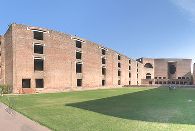 | « Back to article | Print this article |
 The Jet Airways flight from Bombay to Delhi had hardly started taxiing for take-off when the attractive 40-something woman seated next to me, glancing at the stack of IIM reports on my lap, flashed a friendly smile at me and said, "What do you feel about Jairam Ramesh's statement that reputation of IIMs and IITs are not because of their faculty and research but because of their excellent students?"
The Jet Airways flight from Bombay to Delhi had hardly started taxiing for take-off when the attractive 40-something woman seated next to me, glancing at the stack of IIM reports on my lap, flashed a friendly smile at me and said, "What do you feel about Jairam Ramesh's statement that reputation of IIMs and IITs are not because of their faculty and research but because of their excellent students?"
I turned around to take a closer look at my co-passenger. She was trim and fresh-faced even at this unearthly hour and wearing what looked to me like a Ritu Beri outfit. "Isn't such a public debate healthy?" I countered as I tried to figure out what kind of an answer would make sense to her.
"I think such statements by ministers bring down the image of institutions that we Indians are proud of," she declared.
* * *
Reputations of higher educational institutions are a complicated thing to unravel. What makes these reputations, whether it is the research output of the faculty or the latter life success of its graduates or even the iconic style of its campus is something that truly deserves a debate.
It is as esoteric a subject as figuring out what sets a company's stock price: over the long run it has something to do with that company's past profits and future prospects but it also seems to matter whether that industry is in fashion right then.
Some academic researchers have even concluded that picking stocks to invest in by throwing darts at a board listing all the companies trading on the stock market and picking those that the dart sticks on is as good a way as doing rigorous analysis. That is to say, random chance, does as well as analytical rigour.
Something similar could be said about the rankings and reputations of business schools.
The rankings that Indian and international magazines give out from time to time usually ascribe a weightage of about 20 per cent to the "quality" of research output.
By far, the highest weight often adding up to as much as 40 per cent across all such rankings is given to the salaries awarded to the institute's graduating students.
And since, in recent years, international investment banks and management consulting companies have offered the best salaries, those institutions that place their students in these sectors tend to get the best starting salaries and hence the best rankings in surveys.
Judging the research output of an IIM is an art form. The current method is to count the number of research papers published in international peer-reviewed journals. This is somewhat like judging a person's health by looking at his weight-to-height